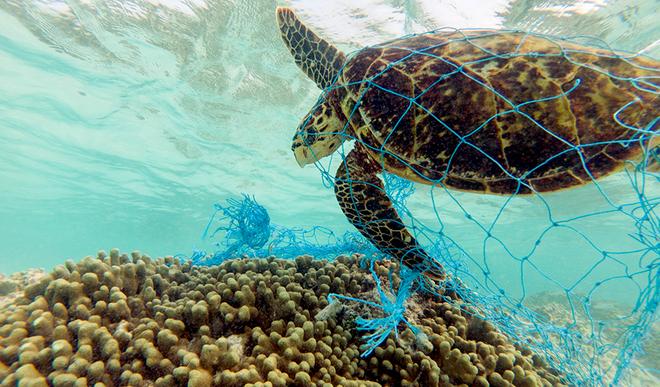About a month ago, during a routine visit to the INS Kalinga Beach, Nature researcher Vivek Rathod stumbled upon an unusual sight. A green sea turtle was washed ashore and badly entangled in ghost gear (fishing gear lost, discarded, or abandoned in the ocean). “By the time I reached the spot, it was bleeding and died within minutes,” says Vivek. The green sea turtle is listed as endangered by the International Union for Conservation of Nature (IUCN).
The incident may just be the tip of the iceberg of an issue that has been impacting the marine ecosystem – ghost gear, that forms a significant part of the marine plastic debris.
Earlier this month, the survey vessel MFV Matsya Darshini of Fishery Survey of India (FSI) Visakhapatnam, during a bottom trawl operation, retrieved around 20 kilograms of ghost gear, plastic litter comprising part of trawl net, vehicle tyre and plastic materials. The survey was carried out at the east of Bheemunipatnam coast at a depth of 41 metres. A similar bottom trawl operation at the southeast of Kalingapatnam was held by the FSI recently where 40 kilograms of ghost gear was found entangled with an otter board wire rope at a depth of 52 metres. The ghost gear comprised largely of gill net, nylon and polypropylene rope. In addition to this, two kilograms of plastic debris was retrieved. The ghost gear and marine plastic litter were segregated and handed over to the Greater Visakhapatnam Municipal Corporation for disposal.
Research indicates that globally, 6.40 lakh metric tonnes of fishing gear are lost in the ocean resulting in a great loss to the fisheries sector and adversely impacting the marine ecosystem. The Food and Agriculture Organisation of United Nations has partnered with many countries to counter the issue with the GloLitter project.
In India, the Fishery Survey of India (FSI) is the lead agency of GloLitter Partnership and has been working towards reducing Sea Based Litter (SBL). “In the last three years, we have retrieved seven tonnes of ghost gear from the Andhra-Odisha coast,” says D B Reddy, Head of Office, FSI Visakhapatnam.
What causes ghost gear accumulation? Researchers say it could be due to snagging where the gear gets caught on reefs, rocks and other obstructions on the seafloor; entanglement; adverse weather conditions leading to loss of fishing gear or gear getting cut by marine traffic; fishing in deep waters; wear and tear over time.
A recent Mongabay India analysis stated that 144 animals belonging to 35 species across India were trapped in derelict fishing gear. The report highlighted the massive litter menace in India, the second-largest contributor to mismanaged plastic in the ocean.

Ghost gear that get submerged or drift in the sea pose serious threats to fish, crustaceans, molluscs, elasmobranchii, marine mammals and sea birds. Scuba divers in Visakhapatnam coast have on many occasions highlighted the impact ghost gear have on marine life by posting underwater videos of endangered species trapped in fishing nets. “We have released many Olive Ridley turtles trapped in nets underwater from places like Mangamaripeta,” says Balaram Naidu of Livein Adventures, a Visakhapatnam-based scuba diving firm.
According to Reddy, ghost gear also create problems in ship navigation due to threat of net entanglement in the propeller of the vessels.
The hotspots
In its recent study, FSI Visakhapatnam has identified 14 hotpots of ghost gear across Andhra Pradesh and Odisha coast. “At places where rivers join the sea, the issue is more pronounced,” adds Reddy. The FSI Visakhapatnam has reached out to the Andhra Pradesh Department of Fisheries for collaborating on tackling the problem. “We have submitted a proposal to establish collection points at the Fishing Harbour where fishermen can hand over ghost gear and earn money from it. We are also in the process of collaborating with recycling organisations for segregation and recycling of ghost gear,” says Reddy.
NGOs and researchers stress on the need for raising awareness, finding solutions for repurposing old gear, and implementing stricter regulations.
Vivek Rathod, a founding member of the Visakhapatnam-based environmental organisation Wildlife Conservation Through Research and Education (WCTRE), says that in most cases in India the buying back mechanism of ghost gear is not an effective economical solution for fishermen.
The World Wide Fund for Nature – India (WWF-India) initiated project studies across the Andhra Pradesh, Goa and Kerala coasts to understand the extent of the problem. In 2023 May, the WWF – India team conducted 15 trial runs on trawler boats for assessing the issue. “We were able to get small bits of discarded nets, but a major part of ghost gear gets settled on the sea floor. The trial runs also brought us face-to-face with huge sea based litter consisting of plastics, which was a major issue,” says Farida Tampal, State Director, WWF-India.
The team also identified the presence of ghost gear vendors in Visakhapatnam who collect discarded nets at the coast. “We observed that low graded nets are sent towards Madurai, where any kind of net irrespective of the grade is processed. The nets are cleaned and sent to net melting plants in Madurai, Raipur and Gujarat for converting them into pellets which again are made into net and other materials,” says Honey Seles, WWF-India’s marine programme officer in Visakhapatnam.
Researchers however observe that the collection mechanism is fragmented and provides little incentive to fishermen for collecting and bringing back ghost gear to the shore. Andhra Pradesh-based organisations like Green Waves Environmental Solutions are planning to set up a ghost net recycling unit in Visakhapatnam. “The major challenge lies in untangling them. We plan to engage with the fishing community and join hands with organisations like WCTRE to come up with a sustainable solution,” says Anil Potluri of Green Waves.







